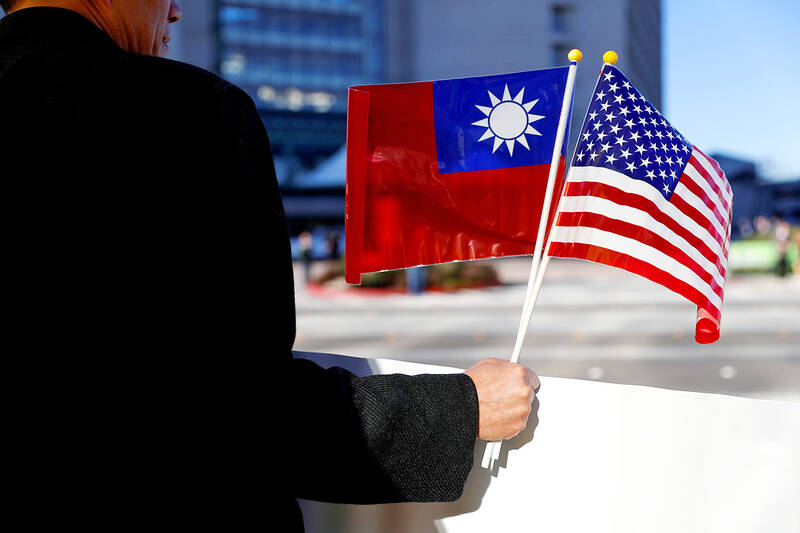A US plan to send 10 officials to study and intern in Taiwan every two years is crucial for the two sides to build trust, Democratic Progressive Party Legislator Wang Ting-yu (王定宇) said.
The US Senate last month passed the Fiscal 2023 National Defense Authorization Act (NDAA), which approved US$2 billion in annual military grants to Taiwan.
One noteworthy part of the NDAA is that it includes the Taiwan Fellowship Act, Wang, who chairs the legislature’s Foreign Affairs and National Defense Committee, said on Sunday.

Photo: Reuters
Under the fellowship act, the US would send 10 federal government employees to live in Taiwan on a two-year fellowship, during which they would spend one year learning Mandarin and about local issues, and the other interning in the public sector, he said.
Such programs enable grassroots civil servants to interact with each other, so that when they become senior officials, they can communicate directly with counterparts in the other country whom they are familiar with, he said.
The fellowship act was inspired by past exchanges between the US and Japan, and such programs have helped build a stable relationship between the US and Japan, he said.
Asked whether the US might intervene in Taiwan’s domestic affairs through such programs, Wang said that they were “thinking too much.”
Taiwan can provide internship opportunities in the public sector for US officials, he said, adding that the Industrial Technology Research Institute might be a good option as its employees are not limited to civil servants.
The main purpose of the act is to create channels for the two countries to exchange not in national defense or security, but in the economy and healthcare, he said.
Asked whether internship opportunities could become available in the US for Taiwanese civil servants, Wang said that more interactions with other countries would be beneficial to Taiwan.
Engaging in international exchanges without compromising Taiwan’s dignity, interests and laws would provide good opportunities for young Taiwanese civil servants, he said.
DPP Legislator Lo Chih-cheng (羅致政) said that the details of the fellowship, including the officials the US would send to Taiwan and the agencies that would provide the internships, are still being deliberated.
The program “is undoubtedly going to cement the relationship between Taiwan and the US,” he said.
If a situation demands the two sides to work together, whether in a time of calm or in an emergency, the exchange would demonstrate its effectiveness, he said.
Lo said he thinks that people who are concerned about the US intervening in Taiwan’s domestic affairs “worry too much,” as exchanges between civil servants and military personnel from different countries are normal.

Taiwan has received more than US$70 million in royalties as of the end of last year from developing the F-16V jet as countries worldwide purchase or upgrade to this popular model, government and military officials said on Saturday. Taiwan funded the development of the F-16V jet and ended up the sole investor as other countries withdrew from the program. Now the F-16V is increasingly popular and countries must pay Taiwan a percentage in royalties when they purchase new F-16V aircraft or upgrade older F-16 models. The next five years are expected to be the peak for these royalties, with Taiwan potentially earning

STAY IN YOUR LANE: As the US and Israel attack Iran, the ministry has warned China not to overstep by including Taiwanese citizens in its evacuation orders The Ministry of Foreign Affairs (MOFA) yesterday rebuked a statement by China’s embassy in Israel that it would evacuate Taiwanese holders of Chinese travel documents from Israel amid the latter’s escalating conflict with Iran. Tensions have risen across the Middle East in the wake of US and Israeli airstrikes on Iran beginning Saturday. China subsequently issued an evacuation notice for its citizens. In a news release, the Chinese embassy in Israel said holders of “Taiwan compatriot permits (台胞證)” issued to Taiwanese nationals by Chinese authorities for travel to China — could register for evacuation to Egypt. In Taipei, the ministry yesterday said Taiwan

Taiwan is awaiting official notification from the US regarding the status of the Agreement on Reciprocal Trade (ART) after the US Supreme Court ruled US President Donald Trump's global tariffs unconstitutional. Speaking to reporters before a legislative hearing today, Premier Cho Jung-tai (卓榮泰) said that Taiwan's negotiation team remains focused on ensuring that the bilateral trade deal remains intact despite the legal challenge to Trump's tariff policy. "The US has pledged to notify its trade partners once the subsequent administrative and legal processes are finalized, and that certainly includes Taiwan," Cho said when asked about opposition parties’ doubts that the ART was

If China chose to invade Taiwan tomorrow, it would only have to sever three undersea fiber-optic cable clusters to cause a data blackout, Jason Hsu (許毓仁), a senior fellow at the Hudson Institute and former Chinese Nationalist Party (KMT) legislator, told a US security panel yesterday. In a Taiwan contingency, cable disruption would be one of the earliest preinvasion actions and the signal that escalation had begun, he said, adding that Taiwan’s current cable repair capabilities are insufficient. The US-China Economic and Security Review Commission (USCC) yesterday held a hearing on US-China Competition Under the Sea, with Hsu speaking on